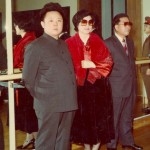His accent is instantly recognisable to millions around the world — but Sir Sean Connery was advised to DROP his famous Scottish brogue at the start of his acting career, it was revealed yesterday.
The cinema icon’s distinctive — and much imitated — burr is well-known for sending a shiver down women’s spines and helping catapult him into mega-stardom.
But the Oscar-winner, noted as one of the best James Bonds, was initially told by directors and producers that his trademark accent would “crush” his chances of success.
It would prove “off-putting” and “difficult for viewers to understand”, they feared.
And acclaimed director and producer Alvin Rakoff (CORR.), who gave Connery his first big acting break in the late 1950s, admits that he almost passed him over for the role of washed-up boxer Harlan “Mountain” McClintock in BBC drama Requiem for a Heavyweight . . . because of the actor’s twang.
Connery went on to become one of world’s sexiest men, starring in seven Bond films and whose “Shaken, not stirred” catchphrase is now synonymous with 007.
Rakoff, now aged 87, says that he and fellow directors thought Connery was “never destined for bigger things” as long as he held on to his Scottish accent.
The TV and Hollywood film director revealed his fears for the first time in more than 50 years at the launch of his first novel, The Seven Einsteins.
 Rakoff said: “I first met Sean Connery as a jobbing actor in his mid 20s. He had the looks and was a very likeable young man who would do anything for you, but I couldn’t see him as a star in the making.
Rakoff said: “I first met Sean Connery as a jobbing actor in his mid 20s. He had the looks and was a very likeable young man who would do anything for you, but I couldn’t see him as a star in the making.
“He’d been a walk-on for me and others in many live TV dramas in the mid 1950s, but we deliberately steered clear of giving him roles with much dialogue because of his accent.
“It was a thick Scottish brogue and we felt that it wouldn’t work well with the productions we were making. In fact, we thought it would be off-putting and distracting, and difficult for viewers to understand. How wrong we all were!”
In a celebrated career spanning more than 60 years, Rakoff has directed more than 100 television plays, as well as a dozen feature films and numerous stage productions.
A twice winner of the International Emmy Award, he has worked with acting legends including Laurence Olivier, Donald Pleasence, Peter Sellers, Kenneth More and Alan Bates.
Rakoff first encountered Connery, now aged 83, during the early 1950s, shortly after he had moved to the UK from his native Canada to work for the BBC.
Impressed by the actor’s physical presence and “effortless charisma”, he soon started using him for walk-on parts in live TV productions including 1956’sEpitaph, which featured Connery in four roles.
But Rakoff, who is still working and is currently in talks to turn his novel The Seven Einsteins — about a secret government plot to clone seven Albert Einsteins — into a movie, says that he “never dreamt” of casting Connery as a lead man.
It was only when he found himself without an actor to play the lead in the British adaptation of teleplay Requiem for a Boxer that he was forced to reconsider.
He said: “For a long time I had him standing much to the side of the principal action. He was great for non-speaking walk-on parts, but I didn’t really see the potential for anything more.
“But in 1957 I was commissioned by the BBC to make a British adaptation of Requiem for a Boxer, which had already proven a huge hit on American TV with Jack Palance in the main role.
“Originally, Palance was set to fly to the UK to reprise his role as boxer McClintock but he pulled out at the last minute and I had one weekend to find a replacement.
“Connery ultimately shined in the part, and it opened the door to bigger and better things, including Hollywood, but I didn’t even think about casting him until my wife at the time, Jacqueline Hill, suggested it.
“At first I thought she had to be kidding. Sean had the build and was very popular with the ladies, but I thought his trademark Scottish hiss would ruin the drama.
“It was only after a read-through with him, where he toned down the Scottish accent, that I realised he actually had the acting chops to make the part his own, and be a star.”




